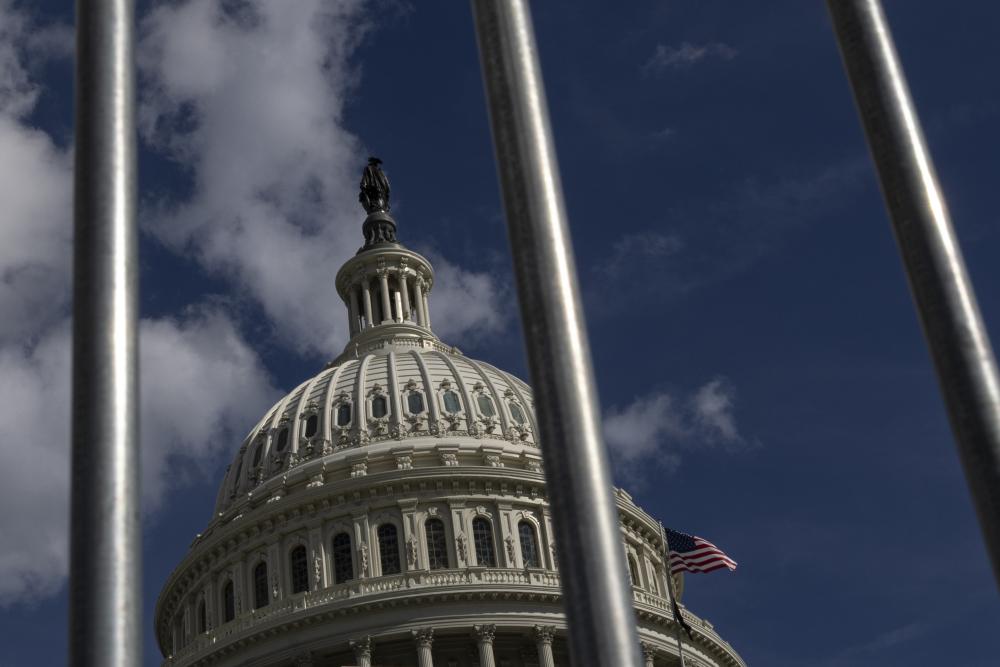The US government remained shut down for a third straight day on Friday, with no signs that congressional leaders had made progress on reaching an agreement to restart operations.
The Senate will convene in the afternoon to vote on dueling Republican and Democratic proposals for continuing funding over the coming weeks, but neither bill appears to have the support to clear the chamber’s 60-vote threshold for advancement. It will be the fourth time senators vote on the proposals, and if neither passes, the first government shutdown since 2019 will be set to continue into next week.
“We have an opportunity to pick up a House-passed bill that, if it passes the Senate, will be sent to the White House, the president will sign it and the government will reopen. It’s that simple and that straightforward, and that’s all we’re talking about here,” Republican Senate majority leader John Thune told reporters at the Capitol.
Funding lapsed after midnight on Wednesday when Senate Democrats refused to provide the votes necessary to pass a Republican-backed funding bill, and demanded concessions on healthcare and other spending priorities.
Related: Government shutdown could cost US economy billions of dollars a week, analysts say
The GOP has balked at their demands, with Thune insisting that the government be reopened first before they are addressed. Donald Trump has threatened to use the shutdown to retaliate against Democrats, and on Friday, the labor department did not release its monthly data on job creation and unemployment, citing the funding lapse. The White House continued its streak of cancelling federal dollars for projects in Democratic-led areas, with office of management and budget director Russell Vought announcing $2.1bn for two transit infrastructure projects in Chicago had been put on hold “to ensure funding is not flowing via race-based contracting”.
Democrats want any spending bill to include a reversal of cuts to the Medicaid healthcare program for low-income and disabled Americans, which Republicans approved earlier this year, as well as an extension of premium tax credits for Affordable Care Act plans. Healthcare costs are expected to rise for about 20 million people if the credits are not extended, while about 10 million people may lose health insurance due to the cuts to Medicaid and similar programs.
The minority party also want money cut from public media restored, and Trump’s “pocket rescission” of foreign aid funds stopped, arguing that it undermines Congress’s power of the purse.
“We’re ready, willing and able to sit down with anyone, anytime, at any place in order to have a conversation about reopening the government, enacting a spending agreement that meets the needs of the American people in terms of their quality of life and addresses the Republican healthcare crisis,” top House Democrat Hakeem Jeffries told MSNBC on Friday.
“Republicans, unfortunately, have shown no interest in doing anything responsible to address the healthcare crisis that they’ve created because they want to continue to wreak havoc on the American people.”
On a near party line vote, House Republicans last month passed legislation, known as a continuing resolution (CR), to fund the government through 21 November. Speaker Mike Johnson then recessed the chamber in a bid to pressure Senate Democrats to accept the bill.
Speaking alongside Thune on Friday morning, Johnson reiterated that he had no interest in considering counteroffers from the Democrats, arguing his chamber’s bill makes no partisan changes to policies.
“I could have put Republican conservative priorities on the CR and sent it over there, but I didn’t. And so when you all ask me, why aren’t you negotiating with them? I don’t have anything to negotiate,” he said.
Johnson went on to repeat the allegation circling among the GOP that top Senate Democrat Chuck Schumer is demanding the healthcare concessions because he fears a primary challenge when he comes up for re-election in 2028.
“Chuck Schumer is a far-left progressive politician, but he’s not far enough left for this base, and so he’s got to show a fight against the president,” the speaker said.
Senate Democrats are championing a bill that would fund the government through October while also implementing their demands on healthcare and government spending. It faces little chance of passage in the Republican-dominated chamber, whose leaders have resolved to continue voting on both proposals, in a bid to exploit any unease among Democrats over the impacts of the shutdown.
In votes on Tuesday and Wednesday, three members of the Democratic caucus voted for the Republican bill, and at least five more are viewed as necessary for it to pass.
“All we need is a handful more Democrats,” Thune said.
Trump has sought to make the stakes of this shutdown unusually high. In addition to slashing funding in a way he has described as intended to punish Democrats, he has threatened to conduct mass layoffs of federal workers.
Several government departments have posted partisan and potentially illegal messages saying their operations are curtailed due to “the Radical Left Democrat shutdown”. Sources at the education department say their out-of-office email messages were changed without their permission to use rhetoric blaming Democrats.

